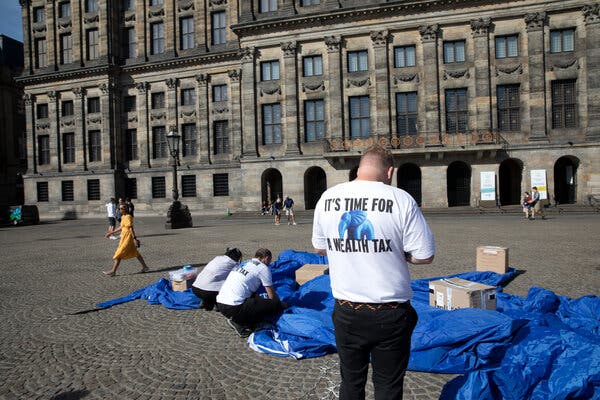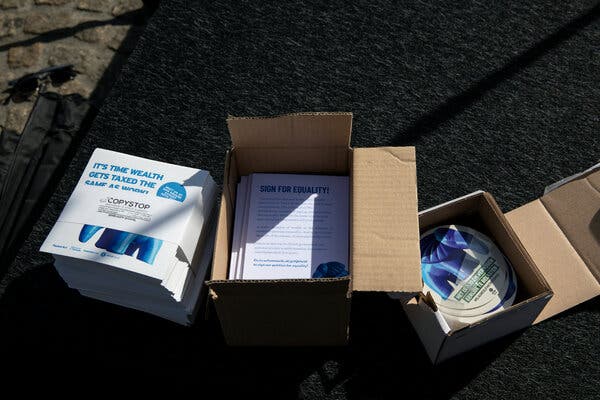| 일 | 월 | 화 | 수 | 목 | 금 | 토 |
|---|---|---|---|---|---|---|
| 1 | 2 | 3 | 4 | 5 | ||
| 6 | 7 | 8 | 9 | 10 | 11 | 12 |
| 13 | 14 | 15 | 16 | 17 | 18 | 19 |
| 20 | 21 | 22 | 23 | 24 | 25 | 26 |
| 27 | 28 | 29 | 30 | 31 |
- 일주일 #일주일휴가
- 남미여행블로그
- 독일사진사 #포르탈레자
- 에드워드리 #흑백요리사
- 보우소나로 #룰라 #브라질대선
- Alexandria Ocasio-Cortez #낙태
- 비트겐슈타인 #키에르케고르
- 베네수엘라 #난민 #주기도문
- 아시아인차별 #미국대학입학 #유대인
- 무어인 #알함브라 #세빌라 #그라나다
- 유일한 축복
- 판타나우 #pantanal
- 포르탈레자 #긴머리총각 #댄서
- 길복순 #약육강식 #아킬레스건
- 뉴칼레도니아 #니켈 #전기자동차베터리 #베이징회담 #중국과러시아
- 통일교 #아베 #재일교포
- 아브라함과롯
- 아르헨티나상식 #ChatGPT
- 인생그리고여행
- Roe v Wade
- 자밀카쇼지 #바이든 #GCC #인플레이션
- 엘리자베스2세 #영연방 #commonwealth #elizabeth
- 심장박동기 #페이스메이커 #테니스
- 피규링야 #worldcupsticker #브라질 #아르헨티나 #카타르월드컵
- 키아누리브스 #산드라블록 #시뮬라시옹 #장자 #호접지몽
- 오징어게임 #황동혁 #이정재
- 한국인 #민족주의 #신채호
- 고양이 #뒷마당 #고양이새끼
- Carnaval #카니발
- 지미카터 #조바이든 #자말카쇼지 #MBS
- Today
- Total
남미의 어느 해변의 브랑코씨
평등한 사회위한 상속세 (NYT) 본문
Marlene Engelhorn은 올해 30세에 거액의 유산을 할머니로 부터 상속받았다. Marlene은 유산 상속 즉 부의 대물림에 대한 그녀의 평소의 지론대로, 큰 부분이 상속으로 인해 일어나는 사회의 부의 불균형에 대해 큰 메시지를 던지기 위해 90퍼센트의 유산을 세금으로 사회에 환원하기로 했다. 일반적으로 상속세는 유럽의 경우 평균적으로 상속금액의 0.5퍼센트인데, 상속이 만들어내는 사회의 불균형의 계층간의 경직화는 다음 세대의 계층간의 부의 이동을 불가능하게 만든다고 보았다. 근거가 있는 말인 것이 유럽을 기준으로 50퍼센트의 부자가 부의 대물림을 통해 부자가 되었으며 이는 거액을 상속을 받은 사람들 중 두 명중 한 명의 확률로 계속 부자로 남게 되는 것이니 거액의 유산 상속이 계층간의 불평등을 심화시킨다는 사실은 분명한 듯하다. 흥미로운 것은 Marlene은 좌파성향의 사회운동가로써 자선사업을 통해 자신의 유산을 사용하지 않는 다는 것이다. 그녀에게 유산은 당연히 사회에 귀속된 것이므로 대부분의 유산이 사회로 돌아가야 하고, 사회 구성원의 속한 집합체인 사회, 즉 정부가 세금으로 대부분을 징수하는 것이 옳고 정의로운 것이라고 믿고 있다는 것이다.
이 부분에서 나는 두 가지 의문이 든다. 첫째, 자신의 재산을 유산으로 통해 자신의 뜻을 이어가 줄 수 있는 배우자, 자녀 혹은 제 3자에게 남길 수가 없다면 혹은 그저 그들의 물질적인 안정과 그로 인한 행복한 삶을 바라며 재산을 유산으로 남길 수가 없다면 누가 열심히 일해서 돈을 모을 생각을 할까하는 것이다. 물론 1퍼센트도 안되는 상속세가 10퍼센트 정도가 되는 정도를 말하는 것은 아니고, Marlene 처럼 대부분의 유산을 세금으로 사회에 환원한다고 하는 것은 사회의 평등을 만드는 것에는 일조할 것이 분명하지만, 자본주의 사회의 성장을 동력을 잃게 할 것임에는 자명한 것으로 보인다. 정체된 사회의 분위기 속에서 재정이 풍부한 정부의 힘은 지금과는 비교할 수 없이 강해질 것이고, 개인이 정부에 기대는 상황이 연출될 것 또한 명확해 보인다.
둘째는 거대한 상속세가 세금으로 환원될 때, 세금으로 전환된 상속세가 정확하게 사회의 정의와 평등을 위해 사용될 수 있느냐 하는 것이다. 유럽의 선진 시스템은 아마 상황이 좀 나을 것 같으나, 미국도 잘 모르겠고 그 이외의 대부분의 공무원과 정치인의 부패가 만연한 대부분의 국가들에게 어마어마한 상속세를 세금으로 던져 준다면 아마도 대부분의 국가에서는 고양이에게 생선가게를 맡기는 꼴이 될 것이다. 그렇다고 기존에 존재하던 세금을 확연히 줄이지도 않을 것이며 아마 공무원과 정부는 부패의 온상이 될 것이고, 공무원과 정치인만 활개를 치는 세상이 될 가능성이 크다.
내 생각이 다소 비약이 있고 과장이 있다고 할 수도 있겠다. 하지만 나의 두 가지 의문은 상속세가 더 높은 세율로 적용될 경우에 항상 고려해야할 부분이라고 생각한다. 그리고 나와는 다른 생각이지만 상속이라는 자신의 권리를 포기하면서 자신의 주장을 펼친 Marlene이라는 사람은 참 용기있고 행동하는 사람이라는 생각이 든다. 사회주의자에 동조하지는 않지만, 가끔 자신의 것을 포기하고 진정성을 보여주는 이런 사람에게는 찐이라는 수식어를 붙여 주고 싶다. 밖으로는 입으로는 사회의 정의니 평등이니 하는 것을 목에 핏발을 세우며 외치면서도, 음지에서 온갖 더러운 뒷구멍을 핥는 자들과는 확실히 다른 레벨의 사람임에는 분명해 보인다.
27.11.2022
원문 https://www.nytimes.com/2022/10/21/world/europe/marlene-engelhorn-wealth-tax.html
She’s Inheriting Millions. She Wants Her Wealth Taxed Away.
Marlene Engelhorn, 30, heir to a fortune, isn’t interested in philanthropy, believing it only perpetuates existing power dynamics. She’s calling for structural change to how the ultrarich are taxed.
www.nytimes.com
She’s Inheriting Millions. She Wants Her Wealth Taxed Away.
Marlene Engelhorn, 30, heir to a fortune, isn’t interested in philanthropy, believing it only perpetuates existing power dynamics. She’s calling for structural change to how the ultrarich are taxed.

By Emma Bubola
AMSTERDAM — By the time her extraordinarily wealthy grandmother died last month, Marlene Engelhorn already knew who she wanted to be the ultimate beneficiary of the enormous inheritance coming her way: the tax man.
“The dream scenario is I get taxed,” said Ms. Engelhorn, the co-founder of a group called Tax Me Now.
Ms. Engelhorn, a 30-year-old who grew up in Vienna, is part of a growing movement of young, leftist millionaires who say they want governments to take a much larger share of their inherited wealth, arguing that these unearned fortunes should be democratically allocated by the state.
For more than a year, Ms. Engelhorn has been campaigning for tax policies that would redistribute her eight-figure windfall — and anyone else’s.
“I am the product of an unequal society,” Ms. Engelhorn said in a speech at a Millionaires for Humanity event in late August in Amsterdam, where activists were calling for wealth taxation. “Because otherwise, I couldn’t be born into multimillions. Just born. Nothing else.”
Her family is no stranger to giving away huge sums. Her grandparents poured a chunk of their fortune into supporting young scientists. Her great-uncle gave millions to an archaeology center. His cousin pledged nearly $140 million to classical music.
But in Ms. Engelhorn’s view, it shouldn’t be the wealthy who get to decide which personal interests and passions deserve their inherited millions.
“There’s no need for another foundation,” she said as she sat by a canal in Amsterdam and ate a loaf of bread she had brought in her backpack. “What’s really needed is structural change.”

Philanthropy to her only replicates the same power dynamics that have created the systemic inequalities she wants to see dismantled, with new tax policies for the super rich an essential aspect of that vision.
The Engelhorn family’s multibillion-dollar fortune originated with Friedrich Engelhorn, who about 150 years ago in Germany founded BASF, one of the world’s largest chemical companies. Another family company, Boehringer Mannheim, which produced pharmaceuticals and medical diagnostic equipment, was sold to Roche for $11 billion in 1997.
As a partial heir to that fortune, Ms. Engelhorn grew up in a mansion in a chic part of Vienna. She attended French-language schools, describing herself as the sort of student who was “correcting grammar mistakes when I heard them.” She played soccer with boys and read voraciously. She said she lacked any awareness of class privilege.
When she saw friends living in small apartments, she wondered why they did not choose to live in a big house with a garden, which is “much nicer.”
“Privilege really gives you a very, very narrow view of the world,” she said.
At university in Vienna, Ms. Engelhorn’s perspective began to broaden.
She volunteered with gay-rights groups and grew interested in the interconnection of racial, gender and economic discrimination.
In early 2020, as Ms. Engelhorn sat in a cafe in Switzerland, where she had gone to see her grandmother on her 93rd birthday, an accountant told her that upon her grandmother’s death, she would inherit many millions of euros.
He told her to enjoy herself. “He said, ‘This is just to be spent,’” Ms. Engelhorn recalled. “Like, ‘Just go play.’”
But to her, the news was more disconcerting than a cause for joy, spurring a tormented reckoning about her place in society.
“I was part of the problem,” she said she remembered thinking. “I am very woke and all, but now: What do I do with all these pretty thoughts?”
As she looked for advice, she entered the orbit of groups of pro-tax millionaires, whose members meet in person or on video calls to discuss their privileges — and how to get the state to strip them away.

Some of the members call the groups, which include Resource Generation and Patriotic Millionaires, a “safe space” where they can open up about what they call the “money story” — an honest account of the real origins of their social status. They acknowledge the crimes often at the heart of their family’s wealth and analyze the sexist and racist components that might have contributed to it.
Perhaps most important, the members are expected to share how they are engaged in what they typically term “reparations” to society.
Some of these groups emerged in the past 20 years or so, but recently their memberships have expanded, driven by what Ms. Engelhorn calls “next gens of wealth” who have a different approach than many of their parents. Instead of trying to give away part of their inheritance, they are now asking how it’s possible they inherited so much to begin with.
Newspapers have mocked some of the language of these groups, calling it sententious and self-reverential, and Ms. Engelhorn complained that some scornful press ridiculed them as “rich kids clubs.”
She credits the groups for helping her realize what could be done differently about wealth redistribution. If she hadn’t encountered them, she said, “I might have also just settled with the status quo.”
Which is easy to do, she noted, “when you can literally afford not to care.”
Some experts outside the millionaire circle have also found the work of these groups helpful.
“I’m really grateful for their voice,” said Amy Hanauer, the executive director at Institute on Taxation and Economic Policy, a think tank in Washington, who said that millionaires can be influential higher tax advocates.
After joining several of these groups, Ms. Engelhorn last year co-founded another one for Central Europe, Tax Me Now, described on its website as “an initiative of wealthy people who are actively committed to tax justice.”
Its policy goal is to implement or to increase inheritance and wealth taxes (Austria, where Ms. Engelhorn lives, abolished its inheritance tax in 2008).
The number of nations in the Organization for Economic Cooperation and Development that taxed net wealth dropped from 12 in 1990 to five in 2020. While a higher number of O.E.C.D. countries tax inheritances, the amount collected accounts for 0.5 percent of all taxes there.
With less money held by the top 1 percent, Europe is less unequal than the United States. But in Europe, family fortunes and old money are more prevalent, with wealth, connections and even occupations passed down through generations. Over half of European billionaires inherited their fortunes, while in the United States one-third did, according to a study by the Peterson Institute for International Economics.
To Ms. Engelhorn, the current tax laws mean that it isn’t just huge amounts of wealth that are handed down; it’s power, too, being distributed in a dynastic way. Taxing wealth, she said, would serve the dual purpose of increasing public resources and taking away political sway from people who have not democratically earned it.
“I don’t think that I should be in power or in charge the way that I could be if I use my wealth accordingly,” she said.

After her speech in Amsterdam, Ms. Engelhorn was given an award for her activism.
“Of all the rich people” who had spoken at the event, Ms. Engelhorn was the one who spoke about the issue of taxation with the greatest passion and honesty, according to Djaffar Shalchi, the founder of Millionaires for Humanity. “She is for me No. 1,” he said.
Ms. Engelhorn rejected the praise of how she speaks about tax issues. “I am not even an expert,” she said. “I am really just rich.”
Whatever her speaking abilities, she has helped generate interest in the issues of wealth and inheritance taxes. This fall, she published her first book, “Geld,” or “Money,” about wealth redistribution. And ever since her first public declaration of her desire for her inheritance to be taxed away, she has attracted steady attention in German-language media.
It is not the first time a member of Ms. Engelhorn’s family has made headlines with tax-related issues. When her great-uncle and archaeology donor Curt Engelhorn sold Boehringer Mannheim, German tax authorities didn’t collect a dime because he had previously moved the company’s legal seat abroad.
Ms. Engelhorn’s multiple radio and TV appearances have resulted in dozens of people reaching out to ask her directly for financial help. She said it wrecks her to say no, but she believes it should not be on her to decide who gets her money.
“I would like tax justice to take this impossible decision off my hands,” she said.
She has committed to giving away at least 90 percent of her inheritance, and wants it to go to the state, but only in the form of a tax, not a donation. “A government who won’t use wealth taxes won’t get a gift just like that,” she said.

Not all millionaires share her passion for taxing wealth.
Ansgar John Brenninkmeijer, heir to a fashion fortune, interrupted Ms. Engelhorn when she was onstage in Amsterdam to ask her angrily if she knew what the wealth tax in the Netherlands was.
“We do have a wealth tax,” he said. “It’s 1.6 percent,” he added, referring to a Dutch tax on the value of a person’s savings and investments.
To Ms. Engelhorn, that was a ridiculously low number.
But later that day, she said it shouldn’t be up to people like Mr. Brenninkmeijer — or herself — to say what’s a fair rate.
“It’s not a rich kid’s place to say,” she said, “what the tax should be.”
Christopher F. Schuetze contributed reporting from Berlin.
'오피니언' 카테고리의 다른 글
| 아사드와 아랍월드 (WSJ) (0) | 2023.04.14 |
|---|---|
| 즈바르터 핏(DW) (1) | 2022.12.07 |
| 월드컵이 가까워진다 (NYT) (0) | 2022.10.07 |
| 브라질 선거. 그 폭풍의 전야 (NYT) (1) | 2022.09.30 |
| 유대인처럼 당하는 아시아인 대학입학생 (NYT) (0) | 2022.09.24 |

